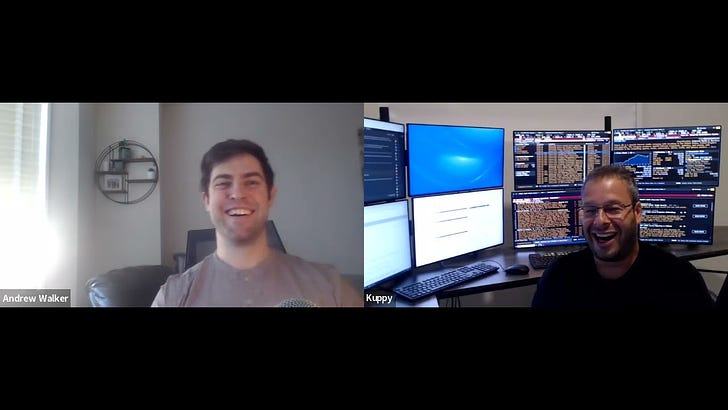Kuppy comes on the pod to discuss his recent filing on LEE. You can find my notes on LEE here, Kuppy’s LEE thesis here, and of course check out KEDM here.
Please follow the podcast on Spotify, iTunes, or most other podcast players, as well as on YouTube if you prefer video! And please be sure to rate / review the podcast if you enjoy it, or subscribe to this Substack (it’s free!) to get all new podcasts and transcripts delivered right to your inbox!
Disclaimer: Nothing on this podcast or on this blog is investing or financial advice; please see our full disclaimer here. The transcript below is from a third party transcription service; it’s entirely possible there are some errors in the transcript!
Transcript begins below
Andrew: All right, hello. Welcome to yet another value podcast. I'm your host, Andrew Walker. And with me today, I'm happy to have my friend, fellow Tulane alumni, Kuppy. Kuppy, how's it going?
Kuppy: Doing great. Thanks for having me on, mate.
Andrew: The real name is Harris Kupperman, but everyone calls him Kuppy. So, hey, let me start this podcast the way I do every podcast. First, a quick disclaimer, nothing on this podcast is investing advice that's always true, but particularly true today, because we're going to be talking about it, it's basically a micro-cap stock that Kuppy's filed a 13d on so obviously, you know where his interest lies. Everybody should just remember that. Please do your due diligence, go consult a financial advisor, not financial advice. And then the second way I start every podcast is with a pitch for you, my guess, I don't think it's crazy to say Kuppy can be a little out there in his thinking. But he's one of my favorite people to chat with. He's always pushing me, "Hey, look at this quirky situation, go look at this. Here's something really weird that's going on. People aren't understanding correctly." One of my most profitable people to talk trade ideas and everything. So I'm really excited to have you on KDM. I've been a, you know, day one subscriber from back before it was free. It's a great site. The first thing I open up when it hits my inbox every weekend is, great site, everyone should check that out. There'll be a link in the show notes. But that's not what we're here to talk about. What we're here to talk about is the 13d that you filed last week, the company is Lee Enterprises, the ticker is L-E-E. And with all that out the way I'll turn it over to you, what is Lee? What's so interesting about it, why would you follow 13d, all of that?
Kuppy: Okay, here comes a big monologue. Yeah, thanks for having me. I have been excited to do this. We actually chatted about Lee, I don't know six months ago when I was in Manhattan.
Andrew: I put it in my show notes. I even did a little piece on it in August, Kupppy was fishing me I kind of said, "Oh, news. It's whatever." And the stocks up what 60% since then, so I'm kicking myself about it.
Kuppy: I think it's just starting. It's like two times cash flow and it's growing fast. So look, what is Lee? Lee is a collection of 77 regional newspapers, local newspapers, that's been ridden off for dead multiple times, I basically went dead. But they have a core business with subscribers. And what's happened that got me interested and take a step back, I run a fun we do inflection investing. To me, that means you go to places where no one's paying attention where companies have been beaten down and forgotten about and you catch inflection in the business, whether it's cyclical, like in commodities, or secular like what I see in newspapers, but it catches inflections. And one of my favorite types of inflections is good or bad co. And you have a situation here where the traditional print newspaper has been declining, pretty much since the day I was born.
Through my entire investment career about once a year, so does a great write-up about how newspapers are really cheap, and they just keep declining, and capital gets destroyed. And the good CO is the digital business where it's growing very, very fast. And it really is consistently


